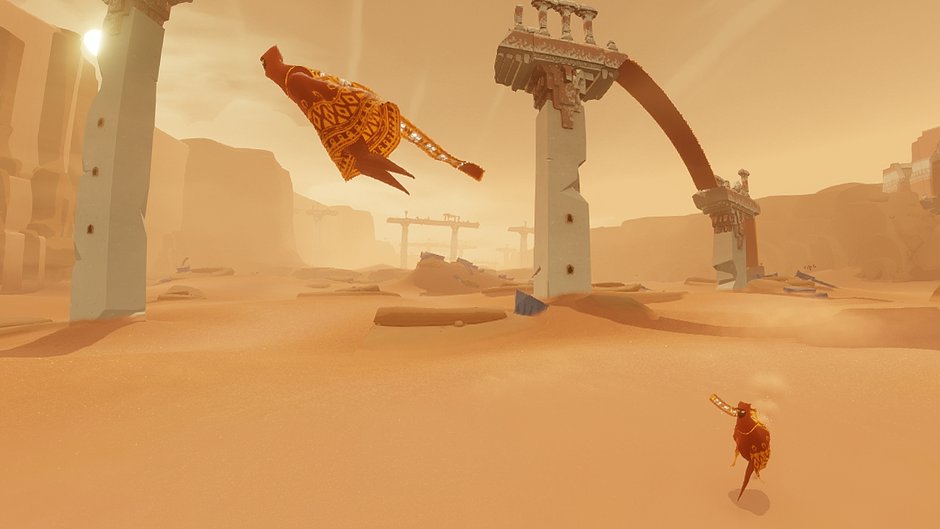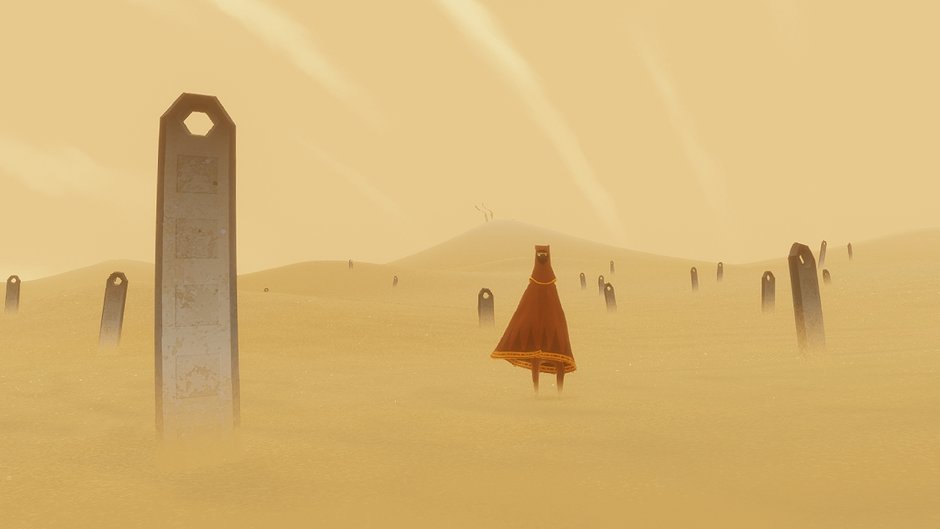WARNING: ARTICLE MAY CONTAIN JOURNEY SPOILERS. I DO NOT REFER TO 1970'S SUPERGROUP; I REFER TO THE PS3 GAME. GO PLAY IT NOW AND THEN COME BACK. IT WON'T TAKE YOU LONG. YOU BACK? WE GOOD? OKAY.
I recently played Journey on PS3, a true masterpiece by thatgamecompany. This is definitely one of those games that's better when you know very little, if anything, about how it plays and what lies in store. I had refused to read reviews leading up to my playthrough; that's just how I roll. Now, I'm using it to learn about the inner workings of some of my English students' brains. The results have been nothing short of amazing.
-GUSHING ABOUT JOURNEY–
Doing so enabled me to see not only the most obvious thing—what a freaking fantastic piece of software it is—but that it puts on a clinic in non-verbal communication. Some people cite disappointment with its length, but you won't find me among them. Journey did in two hours what other games have spent anywhere from 20 to 150 hours attempting; it got a strong, very real emotional response from me. I walked around for like three days thinking about it, looking for any chance I could to talk about it or remember Journey. I looked online to see if I could buy a 30-foot scarf. This game packs power.
-GUSHING COMPLETE. NOW FOR THE SCIENCE-
My "real job" is that of an English teacher in Japan. In addition to the spoken language, I also teach communication at times—you know, beyond just the things you say. One of the first things we get into in those lessons is non-verbal messages—how people see them, what certain things suggest at certain times, context, facial expressions, body language, and all of that good stuff. The way the human mind works is infinitely interesting to me, and I truly love my job.
At some point during my Journey reflection, I thought about what the game is. Really, one might argue that it's not even a "game" in the strictest of traditional terms, as there is no scoreboard, no definitive defeat, no real winning and losing. It really is purely a "journey" from beginning to end. It's how you get there that makes this special.
Aside from a few brief flashes that highlight a button on a controller map, everything about Journey is learned without being taught. You learn that the red floating ribbons are not to be feared. You won't know what they're doing the first time they fly into your character's cloak, but at the very least, you'll see that he's in no visible distress. You just learned something. Only through some degree of repetition of this seemingly mundane event does one notice the pattern and realize that these little fliers are helping the character. Whether it was early or late in your Journey run, at that moment, you learned something else.

I ran this experiment with two different students. I handed them a controller and told them simply to go. I had my notebook and would be writing as they played. They could communicate with each other but couldn't ask me anything. I kept my interference to an extreme minimum. At times, I would tell the kids to stop, then I'd ask what they learned or what was new. They would explain to me things, like "touch the red things, can fly higher" or whatever they had noticed.
It was incredible how their actions in the game reflected the way they approach their English studies. For example, one girl has a pronunciation problem when reading. She'll begin to read a word, and get the first bit, but then just slur or mumble the second half. For example, she'll make "color" into "curr" in most cases. She's an advanced student and can perfectly understand the words, and even say them without a problem when simply having a conversation. If tasked with spelling words she's never read or only read a few times, this girl can usually get it (or get within reason, az wee all no how inkonsistent English speling can bee). Yet, she doesn't fight with all her power. She loses patience with words and bails out, oftentimes. So I watched this girl play Journey….
At any chance, she was running away from opportunities to explore. Walk in a straight line for a while, turn; walk this way a bit, curve away from that direction before arriving at anything resembling a destination. She actually skipped a lot of what I thought was required to do, and I'm still not exactly sure how it worked. During a play session shared with another student, this girl watched as her classmate came so close to figuring something out, yet when given the controller herself, she turned the character 180 degrees away and tried to escape. You know how almost everyone who plays Journey will at some point run up against the windy desert walls, only to beheld withing the boundaries of the game? She's had three separate instances of that, whereas her classmate has had none in the same amount of play time. She's in a constant state of fleeing from any challenge other than the most minor.
"Color" becomes "Curr."
"Surrounded" becomes "Surrod."
"Evening" becomes "Evnn."
And a chance to puzzle something out becomes a dash in the opposite direction.

It hit me like a ton of bricks. The way she approaches reading aloud is the same way she has been approaching this game. She begins reading a word, makes some progress, and then fudges through the remainder. With a controller in her hands and playing Journey, she walks up to a set of ruins, takes only the briefest pause, and proceeds straight through them without a second thought. (I can tell you that this girl isn't just trying to motor to the end of her lesson, either. She loves video games.)
While I'd noticed and corrected her reading of the words most of the time (background: we're reading and discussing the Magic Tree House series in her class), I hadn't realized that the way she deals with reading aloud may be similar to the way she approaches all kinds of situations. This behavior might run deeper than just reading books. I of course can't analyze every aspect of her life and personality from the hour spent watching her play Journey, but this link and others were fascinating to notice.
Outside of this one girl about whom I learned a great deal, the game has served as a great tool for teaching communication. Talking about the way the floating pieces of cloth act, what certain things could mean, and so on, floored the students and even me. My students have been stunned by how many different ways one thing could be understood, as most people are when they have discussions like this. One man's trash is another man's treasure; beauty is in the eye of the beholder; and the tall man in white could be your father, your friend, a god, The God, a memory, a spy, or a frenzied hallucination.
Chalk this up as yet another punch in the face to the old stereotypes that video games are purely for teenagers or can provide humanity with nothing more than fruitless time-wasting. With thatgamecompany's Journey, my students and I have been learning about the world around us, each other, and ourselves.











